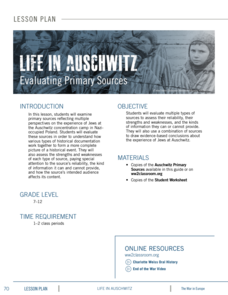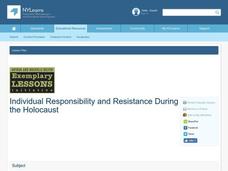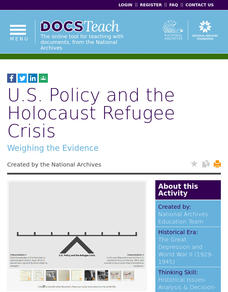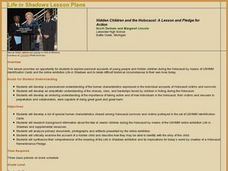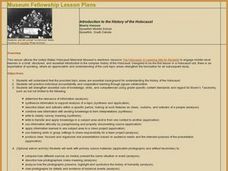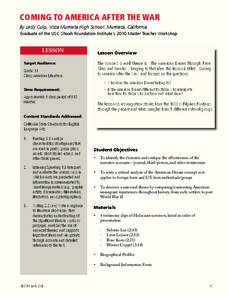Curated OER
Analyzing Primary Sources
Analyzing primary and secondary sources is a necessary skill for students to attain, and can be learned through interesting activities.
Echoes & Reflections
The Children and Legacies Beyond the Holocaust
Using video testimony, primary source documents that detail international agreements, and structured discussions, learners consider the precarious position of children during the Holocaust and other international conflicts, and how to...
National WWII Museum
Life in Auschwitz: Evaluating Primary Sources
Historians explain what happened during the Holocaust, but only primary sources portray the true horror of places such as Auschwitz. Using accounts from those who survived the camps, as well as a Nazi government official's memoirs, class...
Curated OER
Using Primary Sources to Study the Holocaust
Engage your middle schoolers with Pastor Martin Niemoller's famous poem that begins, "First they came for the communists." Now that you have their attention, send learners to the various work stations you created to have them explore...
Curated OER
Communities in Crisis Lesson 1: Primary Source? What is That?
Distinguish between primary and secondary source documents using the theme of philanthropy. Middle schoolers discuss Anne Frank: The Diary of Young Girl as a way to study the past using a primary source. Then they investigate how to...
Curated OER
"You're Probably Tired, Dear Diary" - Children's Diaries during the Holocaust
As part of the study of WWII and the Holocaust, class members read a series of diary entries written by children during the onslaught of Nazi occupation. Each entry is accompanied by biographical information and discussion questions. The...
Curated OER
Individual Responsibility and Resistance During the Holocaust
Students examine what obstacles hinder resistance, what types of resistance are possible and how different individuals resisted Nazi oppression. They examine primary source documents related to the Holocaust and analyze various sources...
Echoes & Reflections
Timeline of the Holocaust
An interactive timeline uses images, videos, primary source documents, and links to informational text to chronicle the history of the Holocaust from 1933-1945.
Echoes & Reflections
Survivors and Liberators
The end was just the beginning. The period immediately after the end of World War II and the Holocaust is often called "The Return to Life" as survivors looked to reunite and recreate broken families and shattered lives. A two-lesson...
Echoes & Reflections
The Ghettos
Young historians examine primary sources, including diaries, poems, and photographs, to consider the conditions in the ghettos and how they fit into the escalation of the Third Reich's plot against the Jewish people.
Carolina K-12
Introduction to the Holocaust
Young historians gain a well-rounded insight into the tragedy of the Holocaust by exploring pre-war Jewish life, reading and discussing survivor testimonies, and illustrating their understanding by using their own words and those of a...
Echoes & Reflections
Jewish Resistance
Resistance to the Holocaust took on many forms. Learners explore the passive and active resistance of Jewish people who continued their practices and observances, as well as organized resistance against the evils of the Nazis. An...
Echoes & Reflections
Perpetrators, Collaborators, and Bystanders
After the Holocaust, the world grappled with how to bring justice to the Nazis. But what to do with the thousands—if not millions—who allowed it to happen? Young historians consider the issues of guilt, collaboration, and responsibility...
DocsTeach
U.S. Policy and the Holocaust Refugee Crisis
How did the United States respond to the Holocaust refugee crisis during World War II? The activity focuses on the United States' foreign policies and the arguments for and against offering assistance. Scholars analyze historical...
The New York Times
'The Century's Bitterest Journalistic Failure'? Considering Times Coverage of the Holocaust
Rich with primary sources and additional resources, this plan asks class members to think critically about newspaper coverage of the Holocaust. Focusing in particular on the analysis of the article "150th Anniversary: 1851-2001: Turning...
Facing History and Ourselves
Laws and the National Community
When it comes to the law, is justice always served? Teach scholars about how law sometimes enables prejudice of entire groups of people with a unit on World War II that includes a warm-up activity, analysis of primary sources,...
Curated OER
Hidden Children and the Holocaust: A Lesson and Pledge for Action
Students read various personal accounts of children during the Holocaust. Using special identification cards, they relate the Holocaust to historical events in their lifetimes. Examining primary source documents, they describe how they...
Echoes & Reflections
Contemporary Antisemitism
Despite the recognized atrocities of the Holocaust, anti-semitism continues. The 11th and final installment of the Teaching the Holocaust series explores the long-term effects of the Holocaust on modern anti-semitism, asking pupils to...
Echoes & Reflections
Antisemitism
Propaganda and anti-semitism were linked to evil ends during the Holocaust. Using video testimony of Holocaust survivors, examples of Nazi propaganda, and discussion questions, learners explore the roots of anti-semitism in Europe and...
Curated OER
The Real World Revisited
Class members participate in a series of hands on, online, and multimedia activities to identify the difference between primary and secondary sources. They watch a related video and visit a variety of sites to locate primary and...
Curated OER
Introduction to the History of the Holocaust
The Holocaust is unbelievable! Examine this piece of history with your class. Using the Internet, research groups determine the relevance of information presented, compare how different sites present the same information, synthesize...
Museum of Tolerance
Documents That Shape Society
The Bill of Rights is a foundational document of American democracy, much like the Nuremberg Laws were a foundational document of the Reichstag of Nazi Germany. But that's where their similarities end. Engage high schoolers in a...
While They Watched
Teaching the Holocaust
What is the difference between prejudice and discrimination? Between collaborators and bystanders? Guilt and responsibility? Prompt learners to think critically about a very complex and textured topic with an innovative packet of materials.
University of Southern California
Coming to America After the War
As part of their exploration of the American dream, class members examine primary source materials to compare immigrant experiences of those arriving early in our country's history to those arriving in the US after World War II. To...




